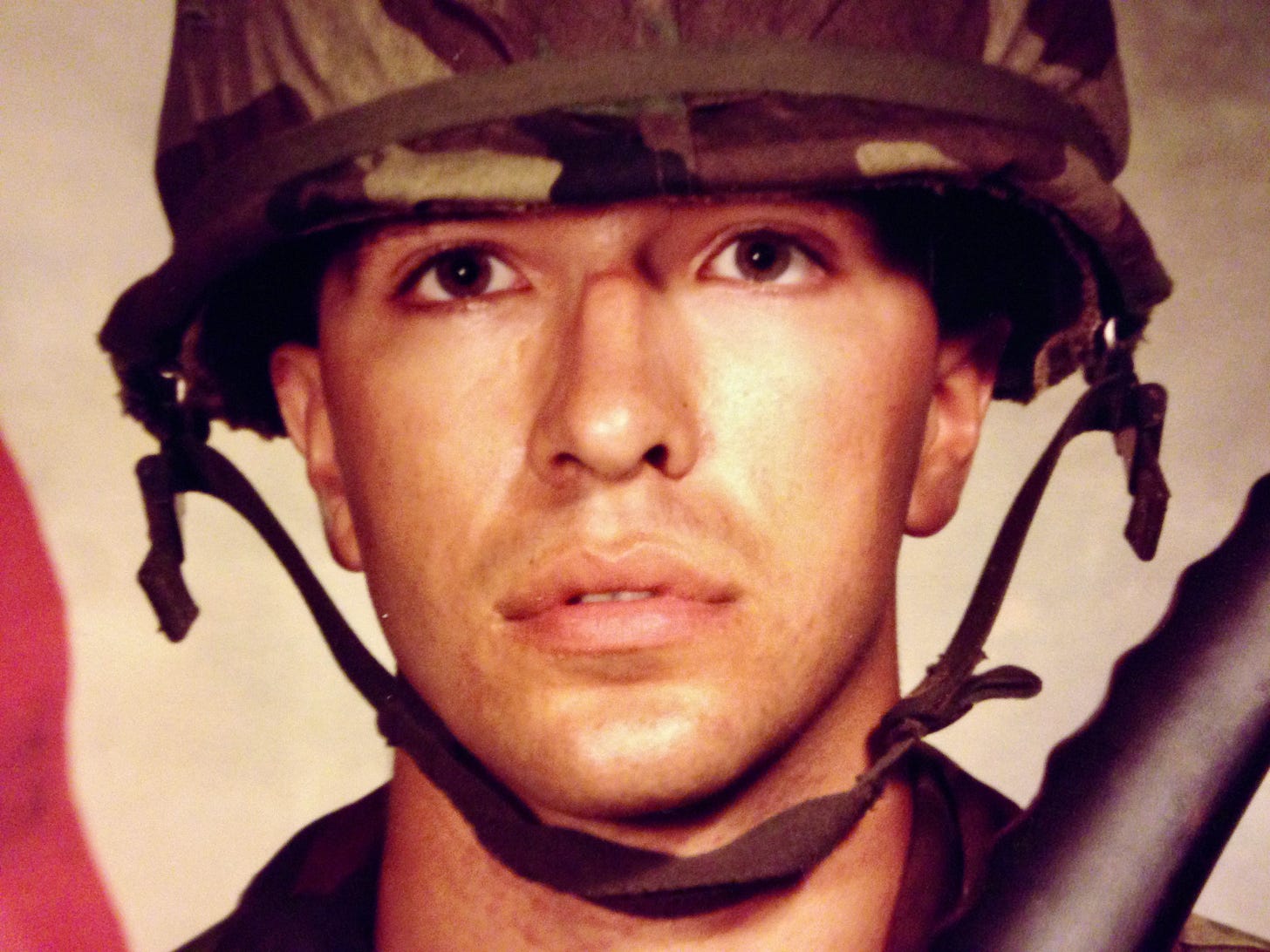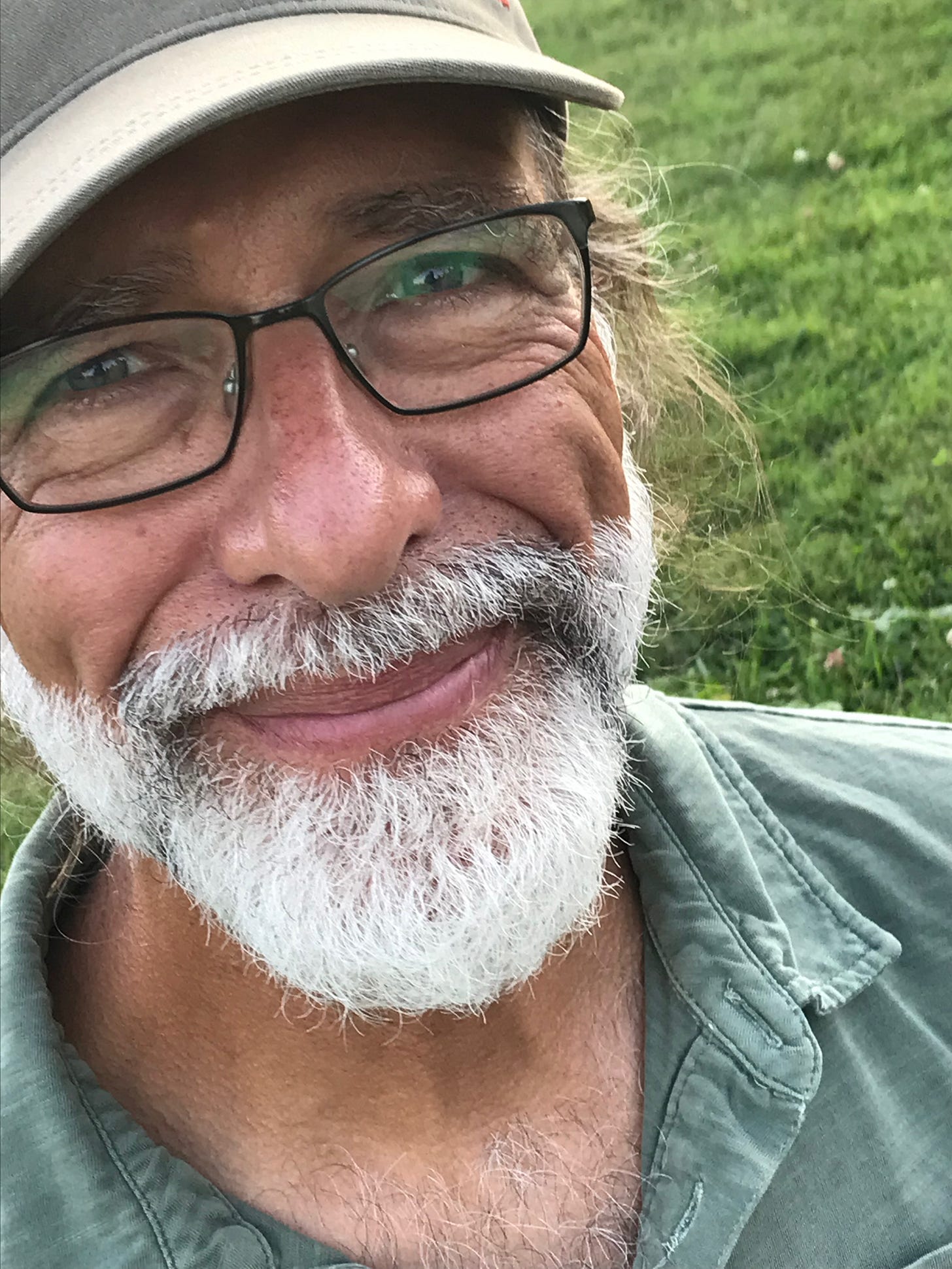You are reading Shy Guy Meets the Buddha: Reflections on Work, Love, and Nature. This weekly newsletter is always free, but if you’d like to show your support, a tip will help me continue the hard work behind these creative efforts; “Buy me a coffee” by clicking the button below. “Liking,” sharing, commenting, and subscribing will help promote my newsletter. Please take a few moments to show you care. Thank you! 💚

WARNING: This essay may be discomforting for some. It includes thoughts of suicide and subversive behavior.
(I will admit that I am somewhat nervous about publishing this auto-biographical essay, concerned about pushback from certain patriotic readers. But if I censure myself for a limited audience, I risk losing my authentic voice, as well as the chance to connect with those who actually need to hear these words, who may be comforted or empowered by them. So, I am pushing past my fears. This work is my truth, and that is what matters in the end.)
In Paul Auster’s Oracle Night, the protagonist, a novelist, is engaged in writing a story about an editor named Nick Bowen. Bowen is fashioned after a minor character named Flitcraft in the classic detective novel, The Maltese Falcon.
Both these characters, Nick Bowen and Flitcraft, experience brushes with death while walking down the street—a steel beam falls at a construction site and misses Flitcraft by inches; a concrete gargoyle breaks away from an old building and crashes to the sidewalk, knocking Bowen’s briefcase from his hand—and subsequently, each undergoes a type of psychological metamorphosis. Both immediately walk away from their lives—their homes, their careers, their wives and children—and begin new lives in new locations; lives completely disconnected from their previous existences.
“I’m dead,” says Bowen, “and whoever I used to be makes no difference anymore.”
Auster is not the first to play with this theme of walking away from a normal, if perhaps unsatisfactory life. Ann Taylor’s character, Delia, in Ladder of Years, who feels invisible in her role as wife and mother, takes a walk on the beach during a family vacation and never returns. Installed in a new town and a new apartment, with a new job and new friends, she explains, when finally located by her family, “I just like the thought of beginning again from scratch.”

And then we have William Somerset Maugham’s Gauguin-inspired character, Charles Strickland, in The Moon and Sixpence, who abandons his large family and a career as a stockbroker to live the poverty-stricken life of a turn-of-the-century Parisian painter, leaving behind a wreck of broken hearts and destitute dependents (and a stockpile of paintings later to be valued in the tens of millions).
This idea of undergoing a life-changing psychological transformation, one that leaves its participant with no choice but to live a wholly different life, and the sense of empowerment behind this revolution of the mind, has always fascinated me, perhaps because I have some experience with it.
Now I am going to make a confession, one I have not told most of my closest friends, nor my parents or siblings.
When I was a young soldier in the United States Army, I contemplated suicide.
I don’t claim to know much about suicide or the depression and other risk factors that often accompany or initiate it. I will speak only from and about my own experience, and I hope I don’t imply any assumption about those who suffer from long-term suicidal ideation.
Let me start with a brief background.
I had no business joining the Army. I did not know when I enlisted at the age of nineteen what a consummate passivist I would later become, but I was always an extra sensitive and non-violent kid. (When I had to punch a class bully in the nose once, I did it softly, and felt sorry for him afterward.) I joined the Army because I wanted some travel and adventure in my life, because I had recently dropped out of college and wasn’t ready to commit to a career path yet, and because the GI Bill would give me education money and four years to decide on a future major. I enrolled in the infantry, as opposed to engineering or food service or communications because, as I said, I wasn’t ready to commit to a particular trade or endeavor, and, besides, all those soldiers on the recruiting commercials hopping out of helicopters and rappelling down cliff faces looked like they were having a damned good time.
The one thing I failed to consider was that I would be training for war, for killing. And I would be obliged to take orders unquestioningly, regardless of how impulsive or foolhardy those orders, regardless of how much I disliked or mistrusted whichever outranking soldier was giving those orders (pretty much every other soldier within sight, outside of my fellow recruits).
I excelled at boot camp because I expected and was fully prepared for the physical regimen as well as the outrageous verbal assaults of the drill sergeants. I’ve seen An Officer and a Gentleman; it’s all an act, I thought, and I will play along. But when I arrived at my full-time duty station at Fort Carson, Colorado, I found that as an infantryman, this kind of treatment would continue indefinitely. I had signed up for four years. I was a crestfallen and changed man after that. A very unhappy man. Probably clinically unhappy.
I’m not going to tell metaphorical war stories (I was enlisted during peace time, so that would be the only kind I could tell), I will just say this: my platoon sergeant, my 1st sergeant, and the company’s commanding officer were all later reprimanded or relieved for poor performance, and in one case arrested and tried for criminal behavior. That is the kind of leadership I was required by law to submit to.
So, let’s now come to the day in question.
It was Sunday and I was off duty. I had left the base and driven up into the mountains for some quiet time on the trails. I now faced the drive back to the barracks and the prospect of another week of monotonous marching, hanging around the motor pool, and standing in final formation, tired and dispirited, long after the other platoons in my company had been relieved for the evening, listening to my grinning platoon sergeant tell dirty stories about his wife and test us with questions about Army tactics and equipment. Correct answers to these questions could sadistically result in the order to “drop and give me twenty,” while an incorrect answer might be illogically rewarded with that longed-for command, “Dismissed!”
Our glib leader enjoyed this head-game just a little too much. I own you, his games implied, and can do with you as I will.
Driving slowly down the mountain that late Sunday afternoon, brooding on these thoughts, my qualms had me down. Down, down, down.
I pulled off the highway into a familiar graveled turn-out and climbed a short trail that led to a rocky outcropping. This overview of the city was a pleasant sanctuary I’d been to before. At night, the view of the lights of Colorado Springs in the distance was breathtaking, and the warm red glow of tail-lights winding through the city and out toward the eastern flatlands—east, the direction of my beloved New England—was a sight to take refuge in. Here was a place far enough from the base that I could relax and pretend I was a civilian; or a wild animal perhaps, a mountain lion, free and independent, perched on his lookout in solemn appreciation of his beautiful homeland.
This time it was not dark; it was about 5pm, and the highway, which passed below me, perhaps a 40-foot drop, buzzed with rush-hour traffic. I was not feeling like a mountain lion this day; more like a cow. Given limited space to graze perhaps, but grazing time was over. Back to the meat-processing facility with you. I didn’t want to go.
I looked down at the tops of the cars and trucks whizzing by, at the hard macadam pavement, at those broken yellow dashes, so ordinary, so hum-drum, so comforting...
I imagined the drop, the hit, the end.
And something happened. Not quite an Auster-esque psychological metamorphosis; no steel beam or gargoyle had crashed at my feet. But just the same, I’d been shocked by my own imagination, by the vision of my body crashing to the ground. Shocked into a new state, a new perspective. The message was clear; if I could take my own life, then that meant that the Army didn’t own me, I did. I owned me.
That choice—the one I didn’t make but could have—was mine to make, nobody else’s. And the sense of empowerment that epiphany left me with was palpable.
And I realized too that if I had made that choice, I would be walking away from an unsatisfactory life into something entirely new. If I possessed that kind of power; if I could completely walk away from my life, from the Army, from the people who were treating me badly, as well as from my duty and my commitment, from the image I had of myself as responsible and loyal and not a quitter, if I could walk away from all that by dying, then I could walk away from all that without dying.
That was the revolution that occurred in my mind and I will never forget it.
I discovered that I was, and am always, free.

I would like to say that I immediately got into my car and drove far, far away, but let’s be realistic; this was no novel. Real life is always more complicated. It took me a few more months to build up the courage to leave (yes, I am talking about AWOL), and even that was a false start. My courage failed me and I returned before anyone knew I was gone. I tried unsuccessfully to change my MOS (military operations specialty), then tried unsuccessfully to become a conscientious objector. Finally, after a total of two distressing years, I went AWOL again, and this time I stayed gone, returning only to process an “other than honorable” discharge (OTH), which, contrary to my near-paralyzing fears about it, never affected my civilian life or career in the least. (I guess I’m not allowed to work for the government, but I never wanted to be a mailman anyway.)
Self-empowerment comes from seeing through the illusions that trap and bind and restrict. This is a subject that I could write a whole other essay about, and perhaps I will soon, but suffice it to say that illusions are ubiquitous. Your own name is an illusion, an illusion that is only as firm as the collective agreement of those who continue to call you by it. Countries are illusions, as are the expectations society holds for you.
The Buddhist teacher Ajahn Chah urged his students repeatedly, when faced with any belief or view, postulate, principle, or conviction—whether their own or another’s—to ask themselves, “Is it certain? Are you sure?” And to continue asking that question all of their lives.
Most likely, a piano isn’t going to fall from the sky and crash down in front of you, and I truly hope you don’t ever feel so desperate as to consider that dark exit door that swings but one way (if you do, please call or write me, or reach out to someone, anyone). There are better ways to realize your freedom. Meditation, for example. It’s really just a matter of pushing aside the veils of illusion that prevent us from directly experiencing that truth.
Joining the Army wasn’t the last mistake I made. Life is messy, after all, and even the most profound lessons can take years to assimilate. But there are certain turning points that you can never forget. For me, the day I first understood that I am the final authority in my life, that I am free, was one of those points. I’ve never been the same.
Wait! Before you go, will you take one moment to hit that SHARE button? This one simple action can be surprisingly effective at helping spread the word and build my readership. Thank you! And remember, subscribing is free and easy, and tips are very much appreciated. 💚









Don - applaud your bravery in being vulnerable about this topic. I am sure it wasn't easy to write something you have kept to yourself for many years. Depression and suicide are epidemics that the military really hasn't learned how to deal with even today. Where I work we manage the Navy Casualty Office which handles all the deaths of active-duty personnel. Each morning the first piece of email I see is the list of those who died the previous day either by natural causes, operational action, or other means. Suicides are a surprisingly large number of those deaths.
As someone who has served in uniform for 24 years and considers himself a patriot, I don't have any negative reactions to your military experience. I will be the first to say military service isn't for everyone and while I take pride in my accomplishments in uniform, I don't think that the uniform defines me as a person. I am actually quite excited to see what the next adventure holds after hanging up the uniform this summer.
Having agency over ourselves and owning our personal freedom are powerful things. We choose how our mind responds to situations. Others may be able at times to control our external environment but only we get to decided how we react to that.
Thanks for sharing your story and all the best.
Don. This is a difficult subject and I honor and appreciate you for sharing. Escape is a natural and deeply imbedded response humans share with most animals, birds, fish, and insects, the whole fight flight thing. Fight isn’t often the feasible option at least not for me as a small child. As the youngest of four boys 20 years apart in age, born to older parents who had intended to stop having children 10 years before I came along and they liked to remind me I was a mistake and how much better things would be if I hadn’t come along. This created a confused and scary environment for a little boy, unwelcome by both parents and siblings. Fight was rarely an option and flight rarely got me very far immediately or in the long run. As I grew, so did the abuse emotionally, verbally and worse physically. Most often the woods worked as a refuge with the intention of never going home again, however three days was my longest escape to the woods at 8 years old, to my surprise and relief it seemed like they didn’t realize I had been gone. In my fantasy world I came up with the idea of dying as an escape. I’d heard my mother talk about suicide as a solution to her misery. As a boy I didn’t have a plan or the courage to follow through if I did. I could only hope for an accident, which caused me to be a risk-taking, accident prone little boy. Injuries, although not consciously intentional, I hoped might extract some empathy or compassion, but usually resulted in the opposite, as my parents would be inconvenienced by my broken bones or need for stitches. The important point I want to make here is that suicidal ideation provided me with a safety valve, ie., “If it gets too bad I can always off myself.” This was a comfort, safety valve or backup plan, this was the one place in my world I had any power. As I grew into an adolescent, my acting out brought consequences less from my family and more from the establishment and the penal system. However these difficulties rarely caused me to take comfort in my backup plan instead I enjoyed the adrenaline rushes. During my 20’s, drugs and alcohol were my escape, although my old friend suicide ideation was there if needed. Into my thirties and sobriety, life took on a more serious responsible tone. Once again my difficulties invoked my safety valve and during especially challenging times I was revisited by the thought I always have a way out, an escape, a safety valve. Through divorce, loneliness, confusion, facing and healing the damage of childhood I always had this secret perverted tool. I never made a plan or an attempt to implement it but I never rid myself of it either. Gratefully it rarely invades my life any more as I think it has become less needed. I find it is most likely to rear its head when I’m focused on the past or future and since those don’t exist my old friend isn’t needed. Never when I’m present am I in need of an escape. At 70 years old I look back with gratitude for what ever it took to get me here. And I thank that clever little boy for doing the best he could. ❤️